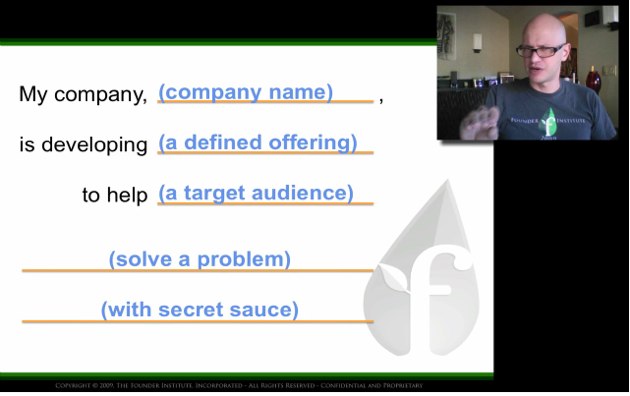Last December, TechCrunch worked with Adeo Ressi from The Founder Institute to host a competition for one-sentence pitches. It’s been a few months — so we’re doing it again.
Distilling your startup idea into a single sentence can be a big challenge, but it’s crucial for communicating what you’re doing to the outside world. (While there are certainly exceptions, I’ve found that it’s a big warning sign when founders can’t succinctly communicate what they do.) Here’s the basic formula: “My company, _(insert name of company)_, is developing _(a defined offering)_ to help _(a defined audience)_ _(solve a problem)_ with _(secret sauce)_”.
So if you’ve got a startup founder, we want you to give it a shot. If you’ve got a pitch, just post it as a comment below. Ressi and his team will be going through every one, weighing in with their comments, and selecting the best ones. Their very favorite one will be offered a scholarship at one of the Founder Institute’s 26 locations worldwide plus a table at the Founder Showcase on April 24, while five more will get a free VIP ticket to the showcase. (You can read the previous winners here.)
You’ve got until 10am Pacific on Monday to submit your pitches, then we’ll feature the winners on a post on Monday evening.
Here are some more thoughts from Ressi on how to craft a good pitch:
Getting a one sentence pitch right is challenging. As a Founder, you will pitch your business hundreds of times to cofounder prospects, to partners, to team members and to investors. You need to grab the listener’s attention quickly, so being able to explain your idea in one sentence is critical. The whole idea for the one sentence pitch came out of a conversation with a top Silicon Valley venture capitalists at the Founder Showcase event. The investors wished that entrepreneurs were more concise in their explanation of the business so that they could make a quick decision on whether to learn more.
Here is a one sentence pitch template that works:
My company, __(insert name of company)__,
is developing __(a defined offering)__
to help __(a defined audience)__
__(solve a problem)__
with __(secret sauce)__.Let’s go through each of the items. The “defined offering” needs to be short, simple and capable of being understood by everyone, like “a website,” “a mobile application,” “hardware,” or “desktop software.” The “defined audience” is the initial group of people that you will market your offering to. In the case of consumer applications, it is usually a demographic, such as “women age 25 to 35 years old.” In the case of business applications, it is usually a job function at a type of corporation, such as “system administrators at medium sized technology businesses.”
Now that you have an offering helping an audience, you need to “solve a problem.” The problem needs to be something that everyone understands, such as “reduce the time collecting bill payments” or “engage in an immersive entertainment experience.” The final component, the “secret sauce,” adds your unique approach to solving the problem and demonstrates a mastery of the market. Some examples are “by sending automated email alerts based on analysis of highest response times” or “with virtual worlds constructed in reaction to the movements of the players.”
There are a large number of common mistakes in any length pitch, but particularly in the one sentence pitch. First, try to avoid using adjectives, particularly superlatives. Never say “first,” “only,” “huge” or “best,” as these are trigger words to signal inexperience. Second, don’t make your market so large that is can be easily confused for everyone or most of everyone on Earth, such as saying “consumers” or “women.” Third, eliminate any buzzwords, acronyms or industry jargon from your pitch. Lastly, keep it short. It’s easy to write a long sentence, but the right thing is to be concise.
